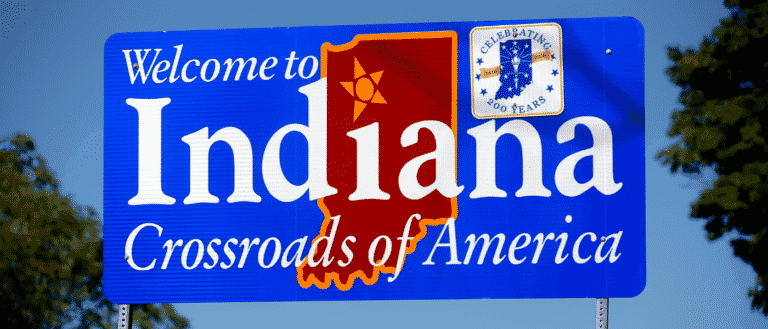Comparing The Six Biggest US Sports Betting Markets

There’s no shortage of data to parse when it comes to the burgeoning legal sports betting markets in the US. Everyone has their vision of what a thriving market should look like, and with so much data on hand, it’s easy to look for datasets that back up your opinions.
This column will examine the biggest sports wagering markets in the US and analyze their performance on a per-resident basis.
- New Jersey Sports Betting
- New York Sports Betting
- Nevada Sports Betting
- Ohio Sports Betting
- Pennsylvania Sports Betting
- Illinois Sports Betting
- Indiana Sports Betting
- Colorado Sports Betting
- Michigan Sports Betting
New Jersey Is a Booming Market
- Population: 8.9 million
- Sports Betting Handle: $931.6 million
- Sports Betting Revenue: $50.6 million
- Tax Revenue: $6.2 million
New Jersey accounts for 17.8% of the total population and an outsized 31% of total handle among the selected sports betting markets. However, its share of revenue and tax revenue is much lower, 22.4% and 19.8%, respectively. That said, both are still above their population averages.
The big question is, what happens to New Jersey numbers when New York legalizes mobile sports betting?
Per Resident Comparison
New Jersey’s sports betting industry took in $105 of bets per resident in November.
New Jersey’s excessive numbers are directly impacted by the substantial New York City border population it pulls from and that state’s lack of mobile sports betting. According to some estimates, 25% of all New Jersey sports bets could be coming from New Yorkers.
The state receives roughly $.70 per resident in taxes.
Nevada Doesn’t Have a Good Comparison
- Population: 3 million
- Sports Betting Handle: $659.9 million
- Sports Betting Revenue: $42.4 million
- Tax Revenue: $2.9 million
Nevada really punches above its weight. The state possesses just 5% of the total population from these six sports wagering markets but can lay claim to 21.9% of all money wagered and 18.8% of the revenue. Because of its industry-low tax rate, it only accounts for 9% of the tax revenue collected.
Per Resident Comparison
At $220 bet per resident, Nevada’s sports betting numbers are light years ahead of every other state, including New Jersey. And like New Jersey, Nevada receives a boost from visitors.
But unlike New Jersey, Nevada relies on visitors from around the globe.
However, that outsized handle doesn’t trickle down to the state’s coffers, as the Silver State sends just over $1 per resident to the state in the form of sports betting taxes.
Pennsylvania Is Doing Things a Different Way
- Population: 12.8 million
- Sports Betting Handle: $525.8 million
- Sports Betting Revenue: $47.8 million
- Tax Revenue: $13.2 million
Revenue data available here.
More than a quarter (25.7%) of these six states’ total population reside in Pennsylvania. At 17.4%, the Keystone State falls short when it comes to its percentage of handle, but it comes closer to holding its own in terms of revenue at 21.2%. Pennsylvania shines on the tax revenue side of the ledger, accounting for 41.5% of all tax revenue collected in these six states.
Per Resident Comparison
Roughly $41 per resident was bet in Pennsylvania in October. But the state receives $1.03 in tax revenue per resident, which is better than even Nevada, despite that state seeing 5.5x more money wagered per resident than Pennsylvania.
Illinois Has the Most Potential of the Bunch
- Population: 12.7 million
- Sports Betting Handle: $434.6 million
- Sports Betting Revenue: $42.2 million
- Tax Revenue: $6.3 million
Revenue data is available here.
Like Pennsylvania, Illinois possesses about a quarter of the total population at 25.5%. Illinois sports betting is still in its infancy, so it’s not surprising to see its share of handle at 14.4%. That number will undoubtedly rise significantly in the coming months as the market matures. That said, Illinois is already holding its own on the revenue front. With an 18.7% share, it is the second-best state in terms of tax revenue at 18.9%.
Per Resident Comparison
After just a few months of mobile wagering, Illinois is already seeing $34 wagered per resident. The state is making the most of that wagering, pocketing about $.50 per resident in tax revenue. That’s not Pennsylvania or Nevada type numbers, but it’s a far better number than the other states on this list.
Overall, Illinois seems to have found the best balance between creating a thriving industry and its benefits to the state.
Indiana Is a Solid Second-Tier Market
- Population: 6.7 million
- Sports Betting Handle: $251.4 million
- Sports Betting Revenue: $25.3 million
- Tax Revenue: $2.4 million
Revenue data is available here.
There’s a significant drop-off from the previous four markets, and the next two, as Indiana and Colorado, don’t possess the population bases of Illinois and Pennsylvania, nor are they benefitting from visitor spending like New Jersey and Nevada.
With 13.4% of the total population, Indiana is below the median of these six states. It generates 8.3% of all money wagered and 11.2% of the combined revenue. On the tax revenue side of the ledger, its share is 7.5%.
Bottom line: Indiana is a strong market, but it lags the big four above it.
Per Resident Comparison
At $37 wagered per resident, Indiana is in step with its competitors not named New Jersey and Nevada. In terms of tax revenue, the state collected about $.36 per resident.
Again, everything points to Indiana being a good but not extraordinary sports betting market.
Colorado Sports Betting Isn’t a Boon for the State
- Population: 5.8 million
- Sports Betting Handle: $210.7 million
- Sports Betting Revenue: $17.4 million
- Tax Revenue: $824,700
Revenue data is available here.
Colorado is another new sports betting market that seems to have a lot of room for growth. The state possesses just 11.6% of this group’s total population and already accounts for 7% of the combined handle and 7.8% of total revenue. One area the state looks to be severely lagging is tax revenue, where its share is a lethargic 2.6%.
Per Resident Comparison
Colorado is already at Indiana levels, with $36 wagered per resident in October. That’s good news for operators, but the state has to be wondering when it will cash in on sports betting, considering tax revenue per resident was just $.14.







